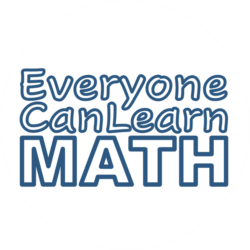This blog post was originally written for The Edu Table Blog. Read the original blog post here.
I hear the same message from frustrated parents year after year, “I was never good at math, so I’m not expecting [my child] to be great at it.” If your child has been hearing this message since they were young, I think they would begin to believe it eventually.
You will often hear me using this analogy: I am a mother to a daughter. I have read many messages urging mothers to be careful with the language they use when addressing body image in front of their daughters – we don’t want to portray our bodies in a negative way which could perpetuate onto our young daughters’ minds.
Can we liken this idea to how we discuss math around our young children?
Unfortunately, the current generation of parents holds many people who hate math. We were brought up to believe that “math people” exist and only these people, with this innate talent, are capable of comprehending the subject. Thankfully, the idea of the “math person” has been proven untrue through the work of Dr. Jo Boaler and her team at Stanford University, YouCubed. We now know that there is no such thing as a math person and that we are all born with the ability to learn math.
The difference now lies in how we handle situations where our child experiences struggle with learning math for the first time. Instead of defaulting to the tempting response of “I was always bad at math, too,” I encourage you to try something different. Perhaps we can respond with “This wasn’t my best subject, but maybe we can learn it together.” I think this sends the message that it is okay to struggle, but we can always try to improve ourselves, even if it takes some hard work. There is no better way to show our children they can learn something new than by learning it with them.
Thoughts for Reflection:
What were your experiences with math learning when you were a child?
Do you carry math anxiety with you as an adult?
How can you ensure you don’t project your anxiety onto your child unintentionally?
What strategies have worked when your child experiences struggle when learning something new?
Keep spreading the math love <3
![]()
